Maradona by Kusturica
Ladies, and gentlemen, does this image signify anything to you? If you're old enough to remember the 1986 Mexico World Cup, it would be impossible to forget the quarterfinal clash between England and Argentina. A game that displayed two of the most legendary goals in footballing history. The first, as pictured, was the controversial 'Hand of God' goal in which a sneaky Argentinean player punched the ball between the English goalposts and got away with it. The second, by the same player, is regarded as one of the most distinguished goals of all time.
Born in a shantytown on the outskirts of Buenos Aires, Diego Maradona, the guy that scored these goals, is an inspiration to millions of football fans throughout the world. In 2008, the Serbian filmmaker Emir Kustrica finished a documentary about this footballing wizard - 'He, for me, is what Elvis Presley or Marilyn Monroe were for the westerners'.
Critics and fans alike celebrate Kustrica for his frenetic filmmaking style. With his colourful kinetic flair and passionate sensibility, he is the talented ringmaster to his own bizarre Circus. He guides the audience through 'spectator visions' of free-form energy (Black Cat, White Cat [1998]) abstract humour (Underground [1995]), obsessive quests (Arizona Dream [1993]) and magical quirkiness (Time of the Gypsies [1989]). He is fervent and volcanic. Kustrica's new documentary is a departure from his flamboyant fantasy-like films. It rummages through the mythology of a man.
The opening sequence to Maradona by Kustrica is not what you expect from a documentary about a football star. It begins in Buenos Aires in Argentina with Kustrica in concert with his band. While strumming Ennio Morricone's theme to The Good, The Bad & The Ugly he is introduced as the 'Diego Maradona from the world of cinema'. The crowd go wild. Kustrica smiles. The musicians play wild gypsy-like music from Kustrica's film Underground. The bands electric vibe makes the hairs on your arm stand up. It's imbued with uncanny energy and unchained passion. With his gravel-like voice, Kustrica's goes through his back catalogue of movies, talking about how great they would have been if Maradona were in them - 'nothing would be easier than to see the footballing magician acting in Black Cat, White Cat'. At this point, a question begins to rattle in your brain, where the heck is Maradona.
Highlighting scenes of himself walking through the airport in Buenos Aires, the camera operator films Kustrica with a sense of 'look-who-I-am' pomposity. After all this egocentric nonsense is over, we are introduced to Diego Maradona at an anti-war rally in 2005. He is stood before a mammoth crowd of people, observing that he would like to 'repudiate that piece of human garbage' known as George W Bush. Kustrica gives us valuable snippets of information like this that explore the political enormity of his footballing hero.
We are exposed to scenes from the 1986 World Cup in which he scored 'The Goal of the Century' against England. Kustrica interviews Maradona about the politics of the game. In Maradona's eyes, the conflict of kicking a ball around a pitch was a way of getting one back for the Falklands War in 1982 - 'we were representing our dead' he says. Maradona is devoted to his anti-imperialist politics and is regarded as a revolutionary figure by Kustrica. As he shows us his tattoos of Che Guerva and Fidel Castro, Kustrica observes that Maradona 'looked more like a character from a film about Mexican revolution than the best footballer of all time, it was as if he had stepped out of a Sergio Leone or a Sam Peckinpah film'.
One thing that becomes apparent throughout this awkward documentary is that Kustrica isn't a documentary filmmaker. There is one inherent mistake in his approach; it's more about political views than a straight-laced memoir of Diego Maradona. The childlike views in Maradona by Kustrica are more akin to the hate bashing of Michael Moore than the views of an objective filmmaker. The main problem with this documentary is that it wraps itself around the comfort of an anti-imperialist context, using America and England as figures of hate.
Even though the biography lacks identity, we do get noteworthy snippets of imagery from Diego's past through black and white home videos. Playing football as a young boy, his brother calls him a Martian. You can see why. He controls the ball with uncanny skill almost as if it's an extension of his own body. Later, when a young Maradona talks to the camera about wanting to play in the World Cup and be a champion of the people you can't help but to see the inspiration and determination in his youthful soul. We see Maradona's mythology is already cemented. He was and always will be a footballing wizard of the greatest magnitude. A Martian to be savoured.
When Kustrica finds the time to interview Maradona, we do get a touching insight into his turbulent life. It explores his fall from grace, the damage drugs did to his reputation and revels the man behind the myth. We also get examples of growing up in the poverty-stricken slums of Argentina. When Maradona visits his childhood home for the first time in 15-years, it's a genuine moment. He discusses the conditions of his life, how his mother used to fake stomach pains so his brothers and sisters could eat more food when there wasn't much to go around.
Another standout sequence happens when Kustrica and Maradona travel to Belgrade Stadium in Serbia. They play football together and reminisce about the past. It's a tender scene with heartfelt sentiment. There doesn't seem a reason why the majority of this documentary is padded out with pointless crap when you get scenes like these. One feels that Kusturica didn't get enough raw material with Maradona so he utilised inane techniques as an escape route.
One of his methods is a repetitive and overused Terry Gilliam inspired animation sequence accompanied by The Sex Pistols 'Anarchy in the UK'. A barrage of political figures including Bill Clinton, Tony Blair, Ronald Regan and George Bush confront a cartoon Maradona as he dribbles the ball towards the goal. Trying to block his path, Maradona uses his footballing skills to avoid their wrath. One of the most mirthful and humorous is with Margret Thatcher. Maradona literally runs circles around her as the cartoon head twists and turns until it pops off. These standalone tongue-in-cheek political cartoons are entertaining but the real reason why they are there is obvious, they are a padding technique to bridge scenes.
Kustrica can't resist stepping into the self-professed shoes of Michael Moore (Bowling for Columbine also contains a cartoon sequence similar to this one). By placing himself at the centre of the film, he loses sight of his subject. The title even displays Kustrica's fascination with his own name. One point that perplexes the senses is when he inter-cuts scenes from his own movies. The only 'passable' reason for this is to back up his own view that Maradona and Kustrica are kindred spirits. Its pure ego caressing. Is this film about a footballer or a filmmaker? Why doesn't Kustrica stay behind the camera where he belongs? It pretentious and absurd to make yourself the centre of a documentary and shove your subject into the shadows. It seems Michael Moore has created a new sub-genre in documentary filmmaking, selfploitation cinema in which you misuse your own talent to highlight the most important thing about the film, yourself. It's a shame Kustrica has jumped onto that 'look at how good I am' bandwagon because he has a lot of talent as a filmmaker.
Maradona by Kustrica is a subjective piece of nonsense that doesn't attempt to explore the objective truths of Maradona's life. The spectacle of style is more important than the spectacle of substance. It's a shame because Maradona is a remarkable individual with buckets of personality. With Kustrica being such an exceptional and talented filmmaker, it's a disappointment to see him produce something of such low-key fan boy quality. If you want to watch an objective documentary on Maradona feast your eyes on the insightful 1995 True Stories documentary on YouTube. It's worlds apart from this piece of gobbledygook.
Verdict: An affectionate yet flawed love letter to one of the greatest footballers of all time.
Special Features: Trailer.
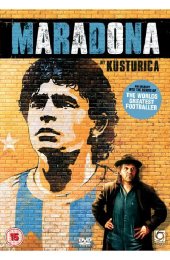
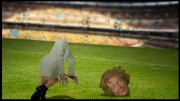


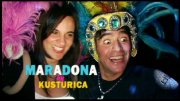
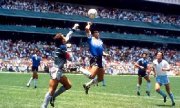
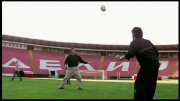
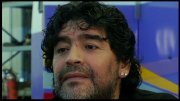
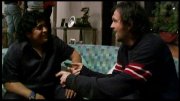
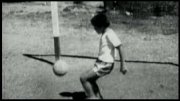










































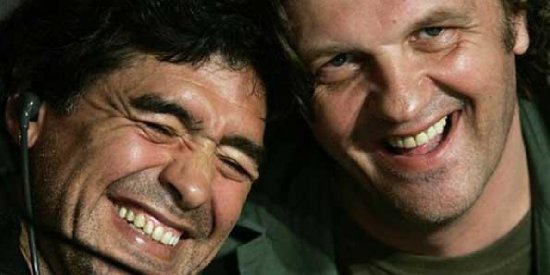
Your Opinions and Comments
Be the first to post a comment!